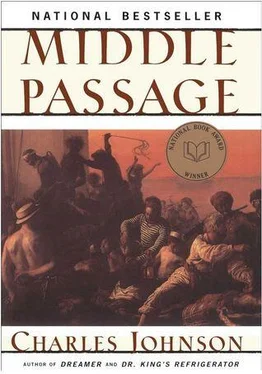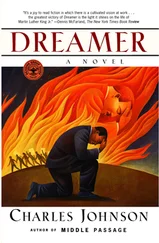(Squibb squinted at me with one eye shut. “Yuh ain’t spinnin’ a cuffer now, are yuh?”
I assured him this was God’s own truth.)
We could tell he was dying — or damn near dead — that spring. He’d never been hale, of course, what with tuberculosis and a curious blood condition that sometimes gave his skin a faint grayish tinge. Cottonlike tufts of gray hair flecked his head, as if he had just rolled over in a field of dandelions. Also he was hard of hearing in his right ear and damned near deaf in the left, his voice an octave louder each year as his hearing failed. Master Chandler always kept an ear trumpet by his side. When he was annoyed at what you were saying, he would lift his trumpet not to his good right ear but rather to his left, effectively relegating you to silence as he smiled and nodded in seeming agreement. At his age, sexual imagery only made him melancholy. He could listen to Jackson play Bach’s St. Matthew Passion or Beethoven’s A Minor Quartet —that deep work of renunciation — downstairs in the parlor for hours. A funny old man, I’d have to say, with the soul of a celibate or contemplative. Yet he was, in most senses of the word, a fair, sympathetic, and well-meaning man, as whites go. In all North America, if you searched up and down, you’d not likely find a more reluctant slave owner than he — one who inherited us and hated the Peculiar Institution — and we knew fortune could have treated us far worse.
As so often happens with sick people who can get no satisfaction from quacks and country doctors, he turned to theology and found in Thomas and the Pseudo-Dionysus a solace that eased his pilgrimage through a broken world. Confined as he was to his sickroom and in nerve-racking pain, he suffered cheerfully, he read over and over Jan van Ruysbroeck’s Flowers of a Mystic Garden, taking notes on blank margins he’d clipped from newspapers and magazines (he hated waste of any sort). Long passages from these works he made Jackson and me read to him, as he made us reel whole cloth from our heads the words of the English mystic William Law: “Love is infallible; it has no errors, for all errors are the want of love.” What he didn’t know about theology was, I guess, not worth knowing. Still, he knew lots of queer arcana too — rags of dubious learning, like how many divisions were in Hell (four), the number of devils there (7,405,926), and all this he passed along to his servants, the Calhoun brothers, when we attended to him.
Needless to say, I set no store by these matters. But Jackson listened. Some of the old man’s aspects (but not all) he admired. He took the role of manservant seriously, but only after twisting it around, even turning it against the various definitions of the South until he became Chandler’s steadiest caretaker of things on the farm. He had, I remember, an uncanny way with livestock. With birds, it went beyond uncanny to downright astonishing. Jackson would toss a pan of hard bread crumbs into the backyard after we had eaten, then walk inside and sit at the window. Minutes later, the yard was blanketed with birds from God knew where, a whole aviary thick enough, I always believed, to walk on if he’d wanted to. They would let him lie down upon them — he was so gentle, so self-emptied — then take off in formation like a magic, feathered rug. Yes, he had a way with birds. And plants as well. They’d explode into bloom from the blink of Jackson’s eye.
He was, I should mention, eight years my senior, so we didn’t exactly grow up together, and to this day I can only guess at what made him tick. To a degree, he viewed me as one more child he must see feed and keep from killing itself by climbing trees or playing too close to the well. And who was our father? How I wish I could say; he ran from slavery when I was three. I have searched the faces of black men on Illinois farms and streets for fifteen years, hoping to identify this man named Riley Calhoun, primarily to give him a piece of my mind, followed by the drubbing he so richly deserved for selfishly enjoying his individual liberty after our mother, Ruby, died, thus leaving me in the care of a brother like a negative of myself. He was (to me) the possible-me that lived my life’s alternate options, the me I fled. Me. Yet not me. Me if I let go. Me if I gave in.
Let me explain.
My older brother, who was tall — maybe six feet three in his stocking feet — with a thick shoebrush mustache, a Julius Caesar haircut, and freckles that ran right across his forehead, had known our father and saw more deeply than I ever could into the rituals of color and caste. He spoke affectionately of our Da, wished him well wherever he had run to, but he could not forgive him for abandoning us to save himself. Riley sent no one to fetch us. As far as we knew, he wasn’t working to buy us out of bondage or living nearby with the Indians, as some black men did, descending on farms to raid and sniper slavemasters the way the colonists did the British. No, he’d cut and run. I know Jackson pondered long on this dilemma: Stay in slavery to serve those closest to you or flee. Run or do your best in a bad situation. To his credit, he stayed, thereby assuring me of having some family. Other bondmen, though, saw his choice as obsequious. On occasion, I saw it that way myself. Rightly or wrongly, he thought it possible to serve his people by humbly being there when they needed him — whites too, if they weren’t too evil, and he was incapable of locking anything out of his heart. There can be, as I see it, no other way to unriddle why my brother, more than any other bondman, was generally faithful to Reverend Chandler, laying out his clothes each morning, combing his dry, brittle hair, fetching his nightly footbaths, and just as regular in the performance of his appointed tasks for the other servants, standing there by everyone’s side through family death and sickness; Jackson was a Sunday preacher in the slave quarters, the model of propriety, and had twice the patience of St. Francis. As you might guess, I was his shadow-self, the social parasite, the black picklock and worldling — in whom he saw, or said he saw, our runaway father. He was ashamed of Riley Calhoun. And of me. Hearing our master was near death that Saturday in May, my brother called me from the grainbin in Chandler’s barn, where I had just managed to get my forefinger inside a gap-toothed, rather delicious-looking Negro girl named Dorothy, our laundress’s daughter. He gave me a sad, scolding preacher look. Scrambling into my clothes, then brushing hay off my calfskin boots and my yeoman’s cap, I pecked Dorothy on the cheek, then followed him up the footpath to the house.
On this day I speak of, Master Chandler was old and full of days. As pale as a parsnip. If I remember rightly, it was raining pitchforks. Isn’t it always on a day of gloom? And the climb behind my brother to the top-floor chamber was the slowest I have ever made. Some part of me loved my brother. Yes. But we couldn’t get along or see things the same way. If you are born on the bottom — in bondage — there are only two ways you can go: outright sedition or plodding reform. I chose the first, expressing my childhood hatred of colonization in boyish foul-ups and “accidents” (setting Peleg’s barn on fire once, breaking things, petty theft, lies, swearing, keeping bad company, forgetting to bathe, fighting, all the things “problem children” normally do), but in the context of the Old South, for a colored boy in Makanda, they were really small acts of revolt — blows against the Empire — though I was too young at the time to know them by their proper name. These things Master Chandler dismissed as youthful folly, then, later, as irredeemable parts of the “Negro character.” But Jackson went the other way: a proper Negro, he was, a churchgoing boy who matched my every irresponsibility with a selfless deed as if he wanted to shame me, or subvert each bigot’s lie about blacks by providing a countertext, saying to the slaveholding world, “Not even this can make me miss a step.” If that was what being a “gentleman of color” amounted to, then I decided I wanted none of it.
Читать дальше












